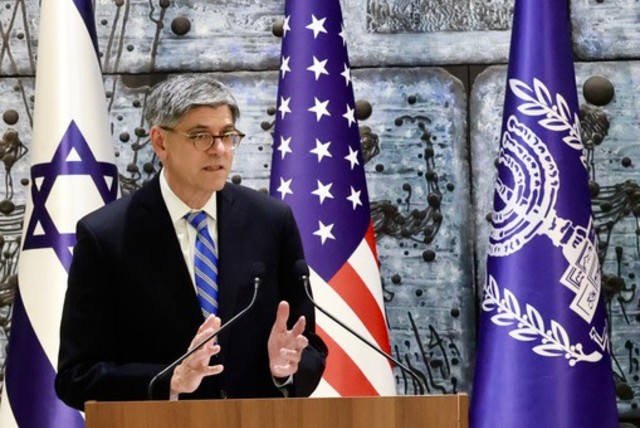US calls on Hamas to free hostages as Sullivan heads to Israel

US Ambassador Jack Lew, as well as ambassadors from Austria, Germany, and Great Britain, called for the release of hostages during a rally in Tel Aviv.
The Biden administration pledged it would never abandon the remaining 128 hostages, alive or dead, as its National Security Advisor Jake Sullivan was due to arrive in Israel on Sunday in an effort to reenergize talks.
“The United States continues to press ahead with negotiations to bring the hostages home,” US Ambassador to Israel Jack Lew told protesters at Hostage Square, as he addressed them for the second time in the last seven months.
“Today marks 225 days since innocents were ripped from their loved ones, children from their parents, parents from their children,” he stated.
“I stand with you here to reaffirm the commitment of the United States – we will not stop working every day to bring all the hostages home,” Lew said, as he recalled that eight of those held in Gaza were US citizens.
“To the family members of those held hostage, I say we hear you. We stand with you."
“Hamas must release the hostages so this crisis can come to an end and we can focus our efforts on bringing peace and stability to the region,” Lew said.
This would be a way to end the fighting, improve humanitarian conditions in Gaza, and “open a path for progress on strategic issues.”
Ambassadors from Europe
Ambassadors from Austria, Germany, and the United Kingdom also took to the stage.
UK Ambassador Simon Walters read out a message from British Foreign Secretary David Cameron, who, like Lew, called on Hamas to free the captives that it seized during its October 7 attack on Israel.
“Our message is clear: Hamas must release every single hostage immediately,” the message from Cameron stated, noting that it was the fastest way to end the war in Gaza.
Any pause to the war that would accompany a hostage deal, he said, “must turn into a sustainable, permanent ceasefire and a new plan for Gaza to ensure that this never happens again.”
They spoke as talks for a deal, mediated by Egypt and Qatar, were at a standstill and IDF soldiers uncovered the bodies of four hostages; Ron Binyamin, 52, Shani Louk, 23, Amit Buskila, 28, and Itzik Gelenter, 57.
In Washington on Friday, US National Security Communications Adviser John Kirby bluntly stated that hostage talks hadn’t gone anywhere in the last week.
“We just didn’t get to a successful conclusion,” Kirby said.
Sullivan, however, is expected to “explore ways to “see what we can do to keep those talks going and get some kind of resolution here,” Kirby said.
“We want to get this done so that we can get six weeks of a ceasefire that can maybe lead to something more enduring,” Kirby stated.
Among the central sticking points have been Hamas’s insistence that any deal must end the war, while Israel has insisted that it must be allowed to complete its military campaign to destroy the terror group.
Prime Minister Benjamin Netanyahu has focused on the need for a major military operation in Rafah, which is considered to be the last Hamas stronghold in the enclave.
The United States, however, believes that Israel can only have limited success in Rafah and would not be able to destroy the terror group.
It has preferred to seek a diplomatic solution, possibly through a large Saudi deal, and has called on Israel not to conduct a major military operation in Rafah.
Kirby said that in his talks with Israeli officials Sullivan would also raise US objections to the Rafah operation, stressing the importance of going after Hamas in “a way that’s targeted, precise, and, quite frankly, effective.”
“We don’t believe that the way to do it is to smash into Rafah with a large body of armed forces on the ground indiscriminately and recklessly.”
“We don’t support a major ground operation or a large operation in Rafah that would put – now it’s about a million people – at greater risk,” he said, referring to Palestinian civilians in the area.
“We’re going to continue to talk to the Israelis about alternatives to major ground operations in Rafah,” he said.
Jerusalem Post Store
`; document.getElementById("linkPremium").innerHTML = cont; var divWithLink = document.getElementById("premium-link"); if (divWithLink !== null && divWithLink !== 'undefined') { divWithLink.style.border = "solid 1px #cb0f3e"; divWithLink.style.textAlign = "center"; divWithLink.style.marginBottom = "15px"; divWithLink.style.marginTop = "15px"; divWithLink.style.width = "100%"; divWithLink.style.backgroundColor = "#122952"; divWithLink.style.color = "#ffffff"; divWithLink.style.lineHeight = "1.5"; } } (function (v, i) { });

